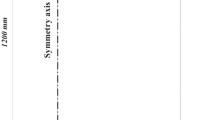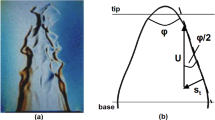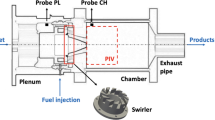Abstract
A subgrid scale flame surface density combustion model for the Large Eddy Simulation (LES) of premixed combustion is derived and validated. The model is based on fractal characteristics of the flame surface, assuming a self similar wrinkling of the flame between smallest and largest wrinkling length scales. Experimental and direct numerical simulation databases as well as theoretical models are used to derive a model for the fractal parameters, namely the cut-off lengths and the fractal dimension suitable in the LES context. The combustion model is designed with the intent to simulate low as well as high Reynolds number premixed turbulent flame propagation and with a focus on correct scaling with pressure. The combustion model is validated by simulations of turbulent Bunsen flames with methane and propane fuel at pressure levels between 0.1 MPa and 2 MPa and at turbulence levels of \(0 < u^{\prime }/s_{L}^{0} < 11\), conditions typical for spark ignition engines. The predicted turbulent flame speed is in a very good agreement with the experimental data and a smooth transition from resolved flame wrinkling to fully modelled, nearly subgrid-only wrinkling is realized. Evaluating the influence of mesh resolution shows a predicted mean flame surface and turbulent flame speed independent of mesh resolution for cases with 9–86 % resolved flame surface. Additional simulations of a highly turbulent jet flame at 0.1 MPa and 0.5 MPa and the comparison with experimental data in terms of flame shape, velocity field and turbulent fluctuations validates the model also at conditions typical for gas turbines.
Similar content being viewed by others

References
Aluri, N., Muppala, S., Dinkelacker, F.: Large Eddy Simulation of lean premixed turbulent flames of three different combustion configurations using a novel reaction closure. Flow Turbul. Combust. 80, 207–224 (2008)
Boger, M., Veynante, D.: Large Eddy Simulations of a turbulent premixed v-shaped flame. Adv. Turbul. VIII (2000)
Boger, M., Veynante, D., Boughanem, H., Trouvé, A.: Direct numerical Simulation analysis of flame surface density concept for Large Eddy Simulation of turbulent premixed combustion. Symp. Int. Combust. 27(1), 917–925 (1998)
Brandl, A., Pfitzner, M., Mooney, J., Durst, B., Kern, W.: Comparison of combustion models and assessment of their applicability to the simulation of premixed turbulent combustion in SI-engines. Flow Turbul. Combust. 75, 335–350 (2005)
Bray, K.N.C., Champion, M., Libby, P.: Pre-mixed flames in stagnating turbulence: part V−evaluation of models for the chemical source term. Combust. Flame 127, 2023–2040 (2001)
Bronstein, I., Semendjajew, K., Musiol, G., Mühlig, H.: Taschenbuch der Mathematik. Harry Deutsch (2008)
Bruno, E., Favini, C., Giacomazzi, B.: Fractal modeling of turbulent combustion. Combust. Theory Model. 4(4), 391–412 (2000)
Celik, I.B., Cehreli, Z.N., Yavuz, I.: Index of resolution quality for Large Eddy Simulations. J. Fluids Eng. 127(5), 949–958 (2005)
Chakraborty, N., Cant, R.: Effects of Lewis number on flame surface density transport in turbulent premixed combustion. Combust. Flame 158(9), 1768–1787 (2011)
Chakraborty, N., Klein, M.: A priori direct numerical simulation assessment of algebraic flame surface density models for turbulent premixed flames in the context of Large Eddy Simulation. Phys. Fluids. 20(8), 085,108 (2008)
Charlette, F., Meneveau, C., Veynante, D.: A power-law flame wrinkling model for LES of premixed turbulent combustion Part I: non-dynamic formulation and initial tests. Combust. Flame 131(1–2), 159–180 (2002)
Charlette, F., Meneveau, C., Veynante, D.: A power-law flame wrinkling model for LES of premixed turbulent combustion Part II: dynamic formulation. Combust. Flame 131(1–2), 181–197 (2002)
Clavin, P.: Dynamic behavior of premixed flame fronts in laminar and turbulent flows. Prog. Energy Combust. Sci. 11(1), 1–59 (1985)
Colin, O., Ducros, F., Veynante, D., Poinsot, T.: A thickened flame model for Large Eddy Simulations of turbulent premixed combustion. Phys. Fluids. 12(7), 1843–1863 (2000)
Constantin, P., Procaccia, I., Sreenivasan, K.: Fractal geometry of isoscalar surfaces in turbulence: theory and experiments. Phys. Rev. Lett. 67, 1739–1743 (1991)
Das, A.: A fractal analysis of premixed turbulent flames. PhD thesis, University of British Columbia (1993)
Dinkelacker, F., Hölzler, S.: Investigation of a turbulent flame speed closure approach for premixed flame calculations. Combust. Sci. Technol. 158(1), 321–340 (2000)
Driscoll, J.F.: Turbulent premixed combustion: Flamelet structure and its effect on turbulent burning velocities. Prog. Energy Combust. Sci. 34(1), 91–134 (2008)
Durand, L.: Development, implementation and validation of LES models for inhomogeneously premixed turbulent combustion. Dissertation, Technische Universität München (2007)
Duwig, C., Fuchs, L., Griebel, P., Siewert, P., Boschek, W.: Study of a confined turbulent jet: influence of combustion and pressure. AIAA J. 45(3), 624–639 (2007)
Ferziger, J.H., Echekki, T.: A simplified reaction rate model and its application to the analysis of premixed flames. Combust. Sci. Technol. 89(5–6), 293–315 (1993)
Fureby, C.: A fractal flame-wrinkling Large Eddy Simulation model for premixed turbulent combustion. Proc. Combust. Inst. 30(1), 593–601 (2005)
Fureby, C., Tabor, G., Weller, H.G., Gosman, A.D.: A comparative study of subgrid scale models in homogeneous isotropic turbulence. Phys. Fluids. 9(5), 1416–1429 (1997)
Goix, P.J., Shepherd, I.G., Trinite, M.: A fractal study of a premixed V-shaped H2/Air flame. Combust. Sci. Technol. 63(4–6), 275–286 (1989)
Göttgens, J., Mauss, F., Peters, N.: Analytic approximations of burning velocities and flame thicknesses of lean hydrogen, methane, ethylene, ethane, acetylene, and propane flames. Twenty-Fourth Symposium on Combustion. Symp. Int. Combust. 24(1), 129–135 (1992)
Gouldin, F.: An application of fractals to modeling premixed turbulent flames. Combust. Flame 68(3), 249–266 (1987)
Gouldin, F., Bray, K., Chen, J.Y.: Chemical closure model for fractal flamelets. Combust. Flame 77(3–4), 241–259 (1989)
Griebel, P., Bombach, R., Inauen, A., Scharen, R., Schenker, S., Siewert, P.: Flame characteristics and turbulent flame speeds of turbulent, high-pressure, lean premixed methane/air flames. ASME Conference Proceedings 2005(4725X), 405–413 (2005)
Gülder, Ö.L., Smallwood, G.J.: Inner cutoff scale of flame surface wrinkling in turbulent premixed flames. Combust. Flame 103(1–2), 107–114 (1995)
Hawkes, E.R., Cant, R.S.: Implications of a flame surface density approach to Large Eddy Simulation of premixed turbulent combustion. Combust. Flame 126(3), 1617–1629 (2001)
Hawkes, E.R., Chatakonda, O., Kolla, H., Kerstein, A.R., Chen, J.H.: A petascale direct numerical simulation study of the modelling of flame wrinkling for Large Eddy Simulations in intense turbulence. Combust. Flame 159(8), 2690–2703 (2012)
Hernández-Pérez, F., Yuen, F., Groth, C., Gülder, Ö.: LES of a laboratory-scale turbulent premixed Bunsen flame using FSD, PCM-FPI and thickened flame models. Proc. Combust. Inst. 33(1), 1365–1371 (2011)
Jasak, H.: Error Analysis and Estimation for the Finite Volume Method with Applications to Fluid Flows. PhD thesis, Imperial College of Science, Technology and Medicine (1996)
Kempf, A., Klein, M., Janicka, J.: Efficient generation of initial- and inflow-conditions for transient turbulent flows in arbitrary geometries. Flow Turbul. Combust. 74, 67–84 (2005)
Keppeler, R., Kranawetvogl, J., Jarcyk, M.M., Pfitzner, M.: Large Eddy Simulationen von Rohr- Kanal- und Freistrahlströmung mit OpenFOAM. Technical report, Universität der Bundeswehr München (2011)
Keppeler, R., Tangermann, E., Pfitzner, M.: Extension of a Large Eddy Simulation combustion model for high pressures and for low Reynolds number flames. Proceedings of European Combustion Meeting, Cardiff (2011)
Kerstein, AR.: Fractal dimension of turbulent premixed flames. Combust. Sci. Technol. 60(4–6), 441–445 (1988)
Klimenko, A.Y.: Examining the cascade hypothesis for turbulent premixed combustion. Combust. Sci. Technol. 139, 15–40 (1998)
Kobayashi, H., Tamura, T., Maruta, K., Niioka, T., Williams, F.A.: Burning velocity of turbulent premixed flames in a high-pressure environment. Symp. Int. Combust. 26(1), 389–396 (1996)
Kobayashi, H., Nakashima, T., Tamura, T., Maruta, K., Niioka, T.: Turbulence measurements and observations of turbulent premixed flames at elevated pressures up to 3.0 MPa. Combust. Flame 108(1–2), 104–110 (1997)
Kobayashi, H., Kawabata, Y., Maruta, K.: Experimental study on general correlation of turbulent burning velocity at high pressure. Symp. Int. Combust. 27(1), 941–948 (1998)
Kobayashi, H., Kawazoe, H.: Flame instability effects on the smallest wrinkling scale and burning velocity of high-pressure turbulent premixed flames. Proc. Combust. Inst. 28(1), 375–382 (2000)
Kuenne, G., Ketelheun, A., Janicka, J.: LES modeling of premixed combustion using a thickened flame approach coupled with FGM tabulated chemistry. Combust. Flame 158(9), 1750–1767 (2011)
Lecocq, G., Richard, S., Colin, O., Vervisch, L.: Gradient and counter-gradient modeling in premixed flames: Theoretical study and application to the les of a lean premixed turbulent swirl-burner. Combust. Sci. Technol. 182(4–6), 465–479 (2010)
Lecocq, G., Richard, S., Colin, O., Vervisch, L. Hybrid presumed pdf and flame surface density approaches for Large Eddy Simulation of premixed turbulent combustion: part 1: formalism and simulation of a quasi-steady burner. Combust. Flame 158(6), 1201–1214 (2011)
Lee, G.G., Huh, K.Y., Kobayashi, H.: Measurement and analysis of flame surface density for turbulent premixed combustion on a nozzle-type burner. Combust. Flame 122(1–2), 43–57 (2000)
Lindstedt, R., Sakthitharan, V.: Modelling of transient compressible turbulent reacting flows. Eight Symposium Turbulence Shear Flows (1991)
Lindstedt, R., Váos, E.: Modeling of premixed turbulent flames with second moment methods. Combust. Flame 116(4), 461–485 (1999)
Lipatnikov, A., Chomiak, J.: Turbulent flame speed and thickness: phenomenology, evaluation, and application in multi-dimensional simulations. Prog. Energy Combust. Sci. 28(1), 1–74 (2002)
Lipatnikov, A., Chomiak, J.: Molecular transport effects on turbulent flame propagation and structure. Prog. Energy Combust. Sci. 31(1), 1–73 (2005)
Mandelbrot, B.B.: On the geometry of homogeneous turbulence, with stress on the fractal dimension of the iso-surfaces of scalars. J. Fluid Mech. 72, 401–416 (1975)
Meneveau, C., Poinsot, T.: Stretching and quenching of flamelets in premixed turbulent combustion. Combust. Flame 86(4), 311–332 (1991)
Müller, U.C., Bollig, M., Peters, N.: Approximations for burning velocities and Markstein numbers for lean hydrocarbon and methanol flames. Combust. Flame 108(3), 349–356 (1997)
Muppala, S., Aluri, N., Dinckelacker, F., Leipertz, A.: Development of an algebraic reaction rate closure for the numerical calculation of turbulent premixed methane, ethylene, and propane/air flames for pressures up to 1.0 MPa. Combust. Flame 140, 257–266 (2005)
Murayama, M., Takeno, T.: Fractal-like character of flamelets in turbulent premixed combustion. Symp. Int. Combust. 22(1), 551–559 (1989)
Peters, N.: Turbulent combustion, 1st edn. Cambridge University Press (2000)
Pitsch, H.: A consistent level set formulation for Large Eddy Simulation of premixed turbulent combustion. Combust. Flame 143(4), 587–598 (2005)
Poinsot, T., Veynante, D.: Theoretical and numerical combustion, 2nd edn. Edwards (2005)
Poinsot, T., Veynante, D., Candel, S.: Diagrams of premixed turbulent combustion based on direct simulation. Symp. Int. Combust. 23(1), 613–619 (1991)
Richard, S., Colin, O., Vermorel, O., Benkenida, A., Angelberger, C., Veynante, D.: Towards Large Eddy Simulation of combustion in spark ignition engines. Proc. Combust. Inst. 31(2), 3059–3066 (2007)
Santavicca, G.L., North, D.A.: The fractal nature of premixed turbulent flames. Combust. Sci. Technol. 72(4), 215–232 (1990)
Schumann, U.: Subgrid scale model for finite difference simulations of turbulent flows in plane channels and annuli. J. Comput. Phys. 18, 376–404 (1975)
Schwertfilm, F., Manhart, M.: DNS of passive scalar transport in turbulent channel flow at high Schmidt numbers. Turbul. Heat Mass Transf. 5, 289–292 (2006)
Siewert, P.: Flame front characteristics of turbulent lean premixed methane / air flames at high-pressure. Dissertation, ETH Zürich (2007)
Smallwood, G., Gülder, Ö., Snelling, D., Deschamps, B., Gökalp, I.: Characterization of flame front surfaces in turbulent premixed methane/Air combustion. Combust. Flame 101(4), 461–470 (1995)
Soika, A., Dinkelacker, F., Leipertz, A.: Measurement of the resolved flame structure of turbulent premixed flames with constant reynolds number and varied stoichiometry. In: Symposium International Combustion, vol. 27, 785–792. Elsevier (1998)
Tangermann, E., Keppeler, R., Pfitzner, M.: Premixed Turbulent Combustion Models for Large Eddy and RANS Simulations. Proceedings of ASME Turbo Expo pp. GT2010–22,298 (2010)
Tangermann, E., Pfitzner, M.: Evaluation of combustion models for combustion-induced vortex breakdown. J. Turbul. 10(7) (2009)
Vervisch, L., Domingo, P., Lodato, G., Veynante, D.: Scalar energy fluctuations in Large Eddy Simulation of turbulent flames: statistical budgets and mesh quality criterion. Combust. Flame 157(4), 778–789 (2010)
Veynante, D., Trouvé, A., Bray, K.N.C., Mantel, T.: Gradient and counter-gradient scalar transport in turbulent premixed flames. J. Fluid Mech. 332, 263–293 (1997)
Veynante, D., Vervisch, L.: Turbulent combustion modeling. Prog. Energy Combust. Sci. 28, 193–266 (2002)
Wang, G., Boileau, M., Veynante, D.: Implementation of a dynamic thickened flame model for Large Eddy Simulations of turbulent premixed combustion. Combust. Flame 158(11), 2199–2213 (2011)
Weller, H., Tabor, G., Gosman, A., Fureby, C.: Application of a flame-wrinkling LES combustion model to a turbulent mixing layer. Twenty-Seventh Symposium on Combustion. Symp. Int. Combust. 27, 899–907 (1998)
Zimont, V., Battaglia, V.: Joint RANS/LES approach to premixed flame modelling in the context of the TFC combustion model. Flow Turbul. Combust. 77, 305–331 (2006)
Zimont, VL.: A numerical model of premixed turbulent combustion of gases. Chem. Phys. Rep. 14(1), 993–1025 (1995)
Author information
Authors and Affiliations
Corresponding author
Rights and permissions
About this article
Cite this article
Keppeler, R., Tangermann, E., Allaudin, U. et al. LES of Low to High Turbulent Combustion in an Elevated Pressure Environment. Flow Turbulence Combust 92, 767–802 (2014). https://doi.org/10.1007/s10494-013-9525-1
Received:
Accepted:
Published:
Issue Date:
DOI: https://doi.org/10.1007/s10494-013-9525-1



